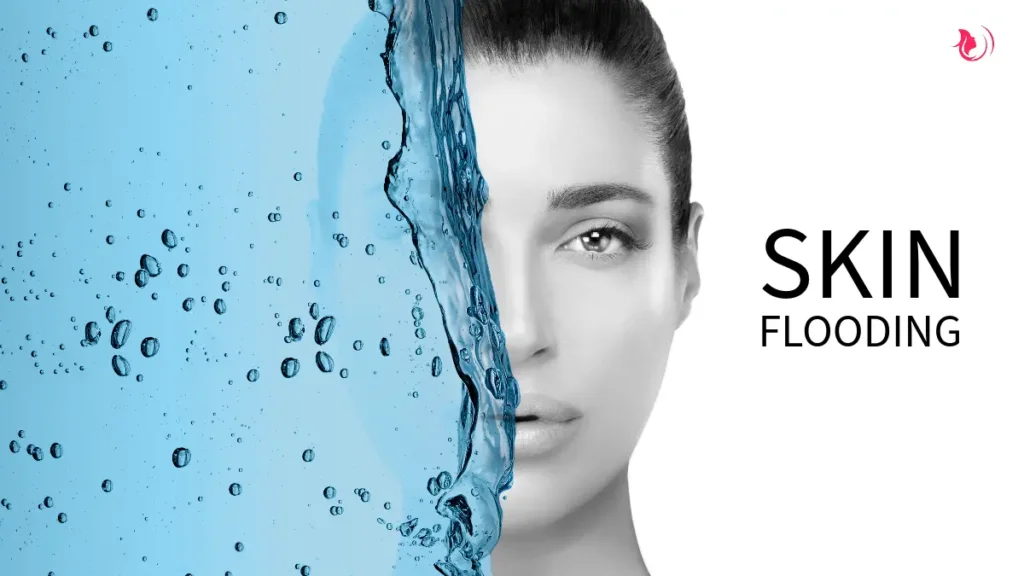In the ever-evolving world of skincare, a new trend has emerged on the horizon – ‘Skin Flooding.’ This technique is swiftly gaining popularity, especially among those seeking to quench their skin’s thirst for hydration. Let’s dive into what skin flooding is, how it’s done, its benefits, and any potential drawbacks.
What is Skin Flooding?
Skin flooding, a novel term in the skincare realm, essentially refers to a meticulous hydration method. This practice isn’t entirely new to skincare experts, as the principle of layering moisturizers has been long known. The distinct aspect of skin flooding lies in its start point – the application begins on damp skin. This technique is rooted in the belief that moist skin more effectively absorbs and retains hydration from skincare products. By sequentially applying hydrating serums, followed by richer creams or ointments, the skin’s ability to hold moisture is significantly enhanced. This layered approach aims to deeply saturate the skin, ensuring maximum hydration and long-lasting moisture retention.
The Methodology
The technique is quite methodical. Begin by cleansing your face with a gentle cleanser, leaving it slightly damp. Damp skin can enhance the penetration and efficacy of hydrating products. Apply a hydrating serum next, ideally containing humectants like hyaluronic acid or glycerin, which draw moisture into the skin. This step is followed by a moisturizing lotion, cream, or ointment to seal the moisture in. For morning routines, always come with sunscreen to protect the skin from sun damage.
Benefits and Who It’s For
Skin flooding is a boon for those grappling with dry, dull, or ageing skin. By intensively boosting moisture levels, this technique breathes new life into tired skin, making it particularly beneficial during the winter months when skin is prone to dryness. Regular application of this method not only imparts a radiant glow but also helps in diminishing the appearance of fine lines, thereby rejuvenating the skin’s overall texture and appearance.
However, it’s important to recognize that skin flooding is not a universal remedy. For individuals with oily or acne-prone skin, the use of heavy occlusives in skin flooding may worsen their skin issues. To mitigate this risk, such individuals should opt for non-comedogenic products, which are specifically formulated to prevent pore blockages. This careful selection of products ensures that the benefits of skin flooding can be enjoyed without exacerbating skin concerns.
Possible Risks
While the risks are minimal, they exist. Using hyaluronic acid without a subsequent moisturizing layer might dry out the skin more. Additionally, sensitive or acne-prone skin might experience irritation or breakouts if the products used are not suitable. It’s crucial to test new skincare products for tolerance before fully incorporating them into your routine.
General Skincare Tips
Dr Natasha Verma’s skincare recommendations emphasize holistic and gentle care. Staying well-hydrated is crucial as it benefits the skin from within, promoting a healthy, hydrated appearance. Using a gentle cleanser is key to maintaining the skin’s natural balance without stripping it of essential oils. Avoiding harsh scrubbing and exfoliation is important to prevent skin irritation and damage, which can lead to sensitivity and accelerated ageing. Applying skincare products on damp skin enhances their absorption and efficacy, ensuring deeper hydration. Lastly, sun protection is paramount; consistent use of sunscreen prevents sun damage, which can cause dryness, dullness, and premature ageing of the skin.
A Word of Caution
Remember, too much of a good thing can be harmful. Over-moisturizing may tax the skin unnecessarily, bringing no additional benefits. It’s about finding the right balance that works for your specific skin type and condition.
Skin flooding is a promising technique for those seeking extra hydration for their skin. However, it requires a careful and tailored approach to ensure it aligns with your skin’s unique needs and characteristics. As always, when in doubt, consult a dermatologist to determine the best course of action for your skincare regimen.


